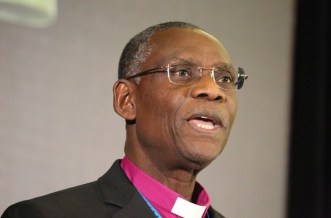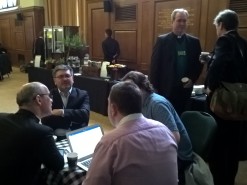Sometimes Synod can be at its most relaxed after a big event. There was plenty of post-match analysis this morning – read on below for more about yesterday. But as people gathered, there was a treat in store, as we were going to say farewell to that larger-than-life figure, Bishop Richard Chartres.
Archbishop Justin paid an affectionate and witty tribute to this long-standing (21 years) Bishop of London. Bishop Richard and Caroline Chartres were up in the gallery, and took a standing ovation from those down on the floor. There were too many anecdotes to record, some beautifully phrased put-downs – and a truly horrendous selection of shirts in some video clips. We shall not see his like again.
No, but seriously…
Then we got serious. The Most Revd Josiah Atkins Idowu-Fearon, the Nigerian Bishop who became Secretary-General of the Anglican Consultative Council in 2015 gave an address. After noting the significance of the See of Canterbury as the mother church of the Communion, and the Church of England as the elder brother of the family of worldwide Anglicans, he got down to what many had been expecting – remarks about our discussions about human sexuality. Anglican-watchers will know that this issue has been the touchpaper for worldwide Anglican dissent and confusion, with GAFCON bringing together conservatives, and the Episcopal Church of the USA being seen as breaking all the rules in its welcome for same-sex marriages.

Dr Idowu-Fearon (Pic: Episcopal News Service)
Surprise! His address was largely eirenical, referring to joint efforts in mission and development, evangelism, and theological education. Even if Provinces are divided on human sexuality, he said, inter-diocesan partnerships flourish. (In Bath and Wells we have a longstanding partnership with the dioceses of Zambia.) And he complimented us on the ‘beautiful gifts’ we are offering the rest of the communion – theological education, Fresh Expressions of church and the Renewal and Reform (R’n’R) programme.
He also paid warm tribute to Archbishop Justin for his sacrificial and demanding ministry. But at the end, he did go into the difficult corner: he said that our discussions on same-sex matters will cause difficulties, whatever we end up doing. But for him, the most pressing issue is the persecution of homosexuals in many countries. In Nigeria, the struggle is for the safety of our gay brothers and sisters. African Anglicans must denounce violence and change attitudes. He praised the C of E’s work in liberalising attitudes in previous decades.(On this, see Graham James’ speech yesterday here).
To finish he talked about needing to set aside difficult issues ‘for now’.’Your struggles are our struggles’. That surprised several people! Read his full text here.
The Church: clergy and/or laypeople?
A serious report called Setting God’s People Free was the next big thing. It addresses the perennial task of putting into practice the theory that everyone subscribes to – that the church consists of many disciples, of whom only a few (maybe 2% in our case) are ordained. (You can read the report here.) In a fiery I dare to dream speech, Mark Russell of Church Army introduced it as something that could enable us to help the 98%. It was quite a performance, and it set out a huge vision for laypeople being disciples at work, and not just in church. There were big smiles (and long applause) from all and sundry after a virtuoso Russell performance.
I observed that the tea room filled up with (predominantly) clergy as this debate began. That maybe just because people wanted a break after sitting down for over an hour listening to the Chartres tribute and Dr Idowu-Fearon. Or it may be that the clergy aren’t persuaded that this report is of great value to them. On the other hand, there were tweeted complaints that despite large numbers of lay reps standing to be called to speak, the Chair seemed to be favouring clergy speeches. Hmmm….
Combined Operations?

Members file into the Chamber (pic from earlier this week)
The Synod ended with a rather low-energy short debate on a Private Members Motion brought by Gavin Oldham of Oxford. Gavin is a successful businessman in the finance sector, and he wanted Synod to adopt a policy of combining ‘back-office’ functions in each of our 43 dioceses in a national facility, to free up diocesan money and energy for mission. His background paper was really unusual, with quotes from Antoine de Saint-Exupery as well as the normal background info and explanation. There was also a helpful paper from the Archbishops’ Council outlining what ‘combined ops’ are already in existence.
I had heard several people say that Gavin’s original proposal was somewhat unrealistic, and it was greatly improved by a successful amendment that focussed the target on getting the Archbishops’ Council to put together some concrete proposals. However, my own feeling was that the idea completely misreads the nature of relationships between individual parishes, churchwardens and clergy and their local diocesan office team. So I spoke (somewhat vehemently for me…) against it.
True to form, Synod then promptly voted in favour of the motion. A speech by Lynas is generally the kiss of death to any proposal he supports. Perhaps I’d better stick to blogging.
Yesterday…

Tea-room chat (pic from earlier this week)
There were lots of huddles in the tearoom in the morning as people picked over the bones of yesterday’s events. The media still can’t work out what it means. Giles Fraser in the Guardian sees it as the clergy being way ahead of the Bishops in their desire to move on with same-sex issues.
But I suspect when the voting names are released (an informed source tells me that’ll probably happen next week) we’ll see it was an unholy alliance of very conservative and fairly liberal people that ensured the vote failed in the House of Clergy. They did so for different reasons: as explained yesterday, the conservatives don’t like it because it’s too liberal, the liberals don’t like it because it’s too conservative. As Bishop Graham James memorably put it: we don’t even agree what we disagree about.
Meanwhile, as I predicted last night, there was some planning and discussion going on behind closed doors about what is going to happen next. The outcome of that is a very clear letter sent out today from the two Archbishops. It sets out a programme of work that will start now. You can read the letter here – it is very interesting and responds to much that was said in the debate. There are four main actions
- Every diocesan Bishop is going to call in his or her Synod reps for an ‘extended conversation’ in which they can set out what they would like to see happen.
- The Bishop of Newcastle, Christine Hardman (an old Synod hand and former Prolocutor of the House of Clergy) is to chair a new Pastoral Oversight Group. Its job will be to give specific advice to dioceses about pastoral situations that are arising. They say ‘the group will be inclusive’, (which I take to mean it will include LGBTI members).
- There will be proposals for a teaching document, as suggested in GS2055 and largely welcomed in group work and the debate.
- They will also ‘suggest’ to the Business Committee that time is found for ‘a debate in general terms on marriage and sexuality’. No timescale is given for that – whether that’s an omission, or there wasn’t time to get agreement on it, but most people will assume that is going to happen in July at York.
And a good thing too: now the dam has broken, we need to immerse ourselves in the flood of a franker and more sympathetic-to-each-other discussion.
The blog: almost as good as being there?
It’s now an established Tradition of the Church that on the last day of Synod I reflect briefly on the impact of this blog. Recidivist readers will know that it began in 2012 as therapy for me in the midst of the women bishops fiascos of that era. It also served as a way of telling people back home in Bath and Wells what was going on.
It’s now developed into a niche form of para(sitic) journalism, and people have been kind enough to be glad about the (relative) objectivity, the tearoom chitchat and the occasional informed source. And even the jokes.
The stats continue to amaze me. This is a snapshot from today.
- There are three readers in Guernsey! I know who two of them are, but who’s the other one? As for Canada, Sweden, New Zealand and the USA…
- There was one from Bolivia last year, but that turned out to be a Synod member who was away travelling, trying to keep up.
- WordPress enables you to see how people find the blog (apart from the 60 or so automatic followers. (If you want to get this automatically, sign up using the little ‘Follow’ button in the right-hand column). Two-thirds of them come via Twitter, most of the rest via search engines.
- Sadly, the Church House Comms department no longer feature bloggers in the Daily Digest (which has a huge circulation and you can sign up to it here – they might not plug me but I’ll plug them…) So my overall readership is down to something just over half of what is was, compared to July, (when they did plug blogs.)

Bathwellschap’s blogger’s kit
In the interests of better understanding of Synod, I always try to link to the relevant source material, so people can see documents for themselves, rather than rely on me (or even more unreliable commentators). The other interesting stat, then, is to see what people do click on.
- Sadly, the top click away from yesterday’s post was the Guardian report on poor Christopher Cocksworth’s EFS (Episcopal Finger Syndrome) incident last night. Such is populism.
- Otherwise, it’s pleasing to see people heading for original GS reports and write-ups of speeches. I really do think that much of the ill-informed comment about the Church’s current work would disappear if more people looked at what we actually do, as opposed to what their favourite paper or blogger say we do.
So that’s why I stay up at night…
bathwellschap will be back when we meet in July. Unless something synodically significant happens before then.
* It’s yesterday once more, The Carpenters, 1973. Super-smooth harmonies and arrangements – no relation to General Synod, then?



Great blog -informative and like the style thank you!
Thanks for all this Stephen – valued insight
Thank you for the blogs. It is so helpful to receive them straight from the “horses mouth”.
Thankyou Stephen for your informative blog which I’m catching up on by a log fire in Dorset.
Pingback: Football crazy, football mad * | bathwellschap
Pingback: I’m going home… * | bathwellschap